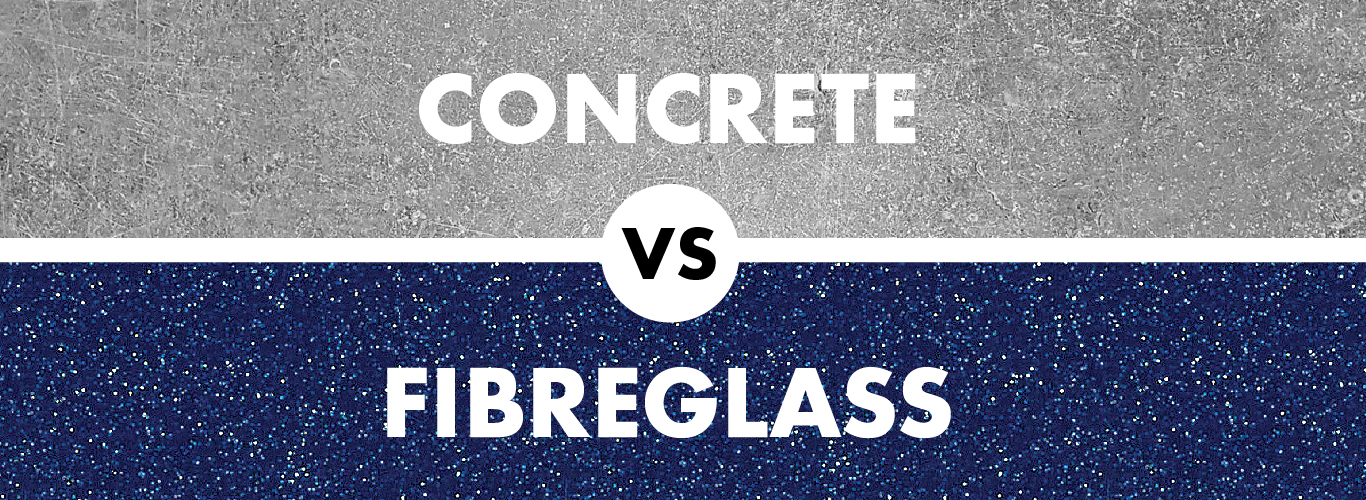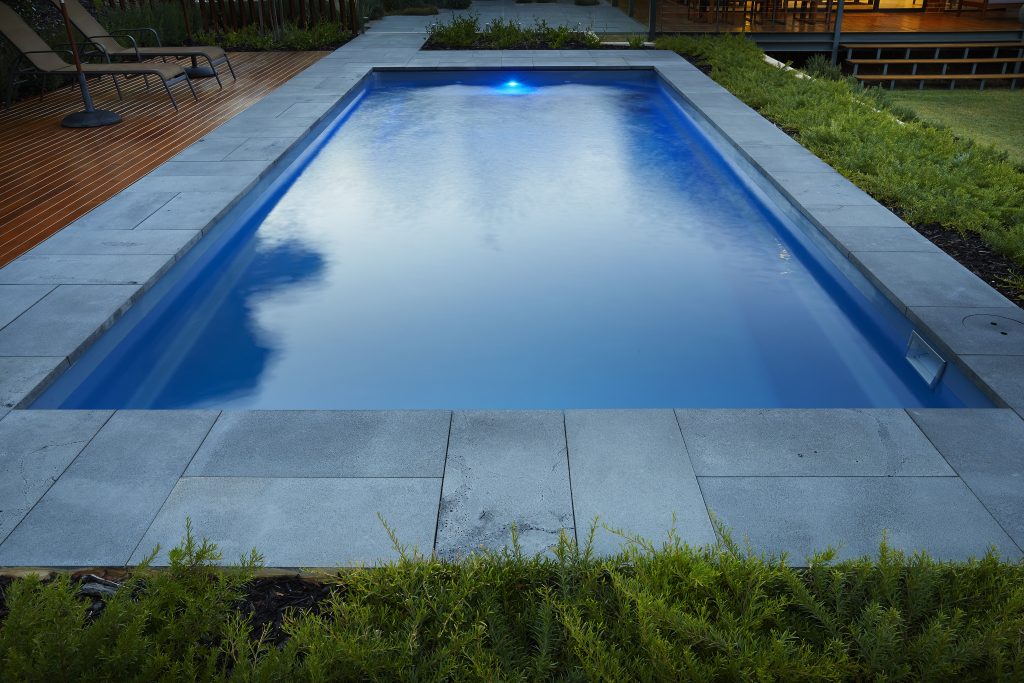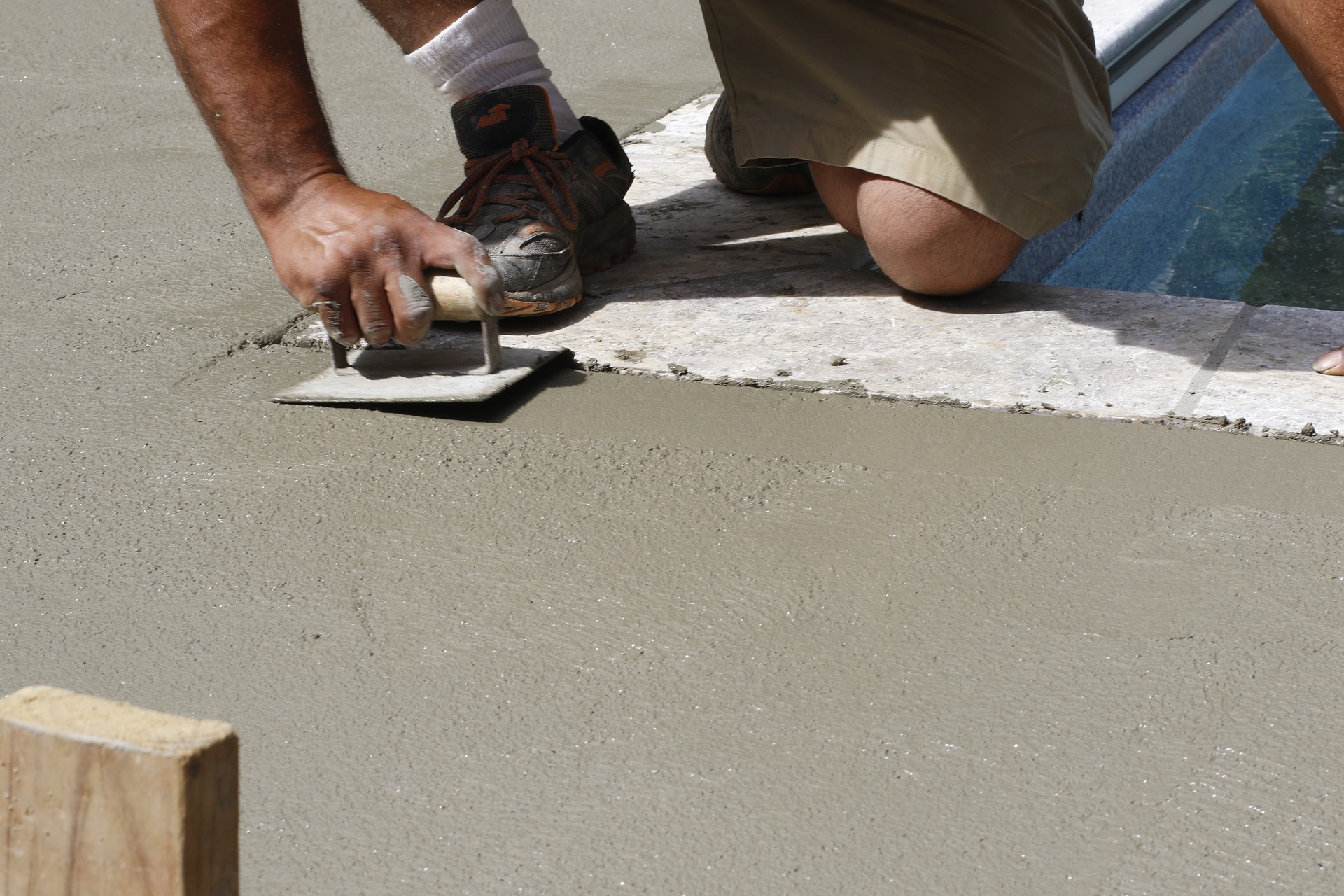Purchasing a pool is a big deal, after all once it is in the ground it isn’t exactly easy to remove. When in the market for a pool, one of the most important things to consider is whether you are going to choose fibreglass or concrete. It is a good idea to do a bit of research to ensure that the pool you buy suits your needs today and for many years to come. Whilst both are great swimming pool options, they do come with their own set of pros and cons.

Fibreglass Pools
Pros
Extremely strong and durable: Fibreglass pools are constructed to have extreme tactile strength. They are designed to withstand harsh Australian conditions and flex with earth movements without the risk of cracking. Advances in technology allow fibreglass pools to be incredibly long lasting whilst maintaining their structure and appearance. Many fibreglass pool shells come with a generous warranty.
Minimal maintenance required: A big positive to fibreglass pools is they are relatively simple to look after and require little effort and time from the pool owner. The interior surface of a fibreglass shell is smooth and virtually nonporous which makes it very difficult for algae and bacteria to adhere to the walls. This means less effort, chemicals and energy are required to keep it healthy and safe to swim in, making them an environmentally friendly option in comparison to concrete.
Ideal for heating: If you were entertaining the idea of heating for your new pool, a fibreglass pool is your best option. Fibreglass insulates the water and retains heat for longer. The heating system doesn’t have to work as hard to warm a fibreglass pool which will reduce the amount of energy expended.
Quick to install: Fibreglass pools are quick to install. Once you have selected your pool and your pool builder has been given the green light from council, it can be installed in as little as 7 days. Concrete pools are more likely to take 3 to 6 months to build.
Modern and contemporary: Fibreglass pools come in many modern styles that are aesthetically appealing. Modern technology enables them to be designed with features such as tanning ledges, non-slip steps and stunning gel coat finishes that all add to the overall appearance of the pool. Reputable pool manufacturing companies use anti- fade technology which allows the pool to maintain its vibrant colour over its lifespan.
Next to no ongoing care required: Another great thing about owning a fibreglass pool is that once it is installed it requires very little ongoing care. The interior surface is chemical, heat and UV resistant that will never need replacing. Concrete pools on the other hand need to be resurfaced every 10 to 15 years.
Compatible with salt chlorinators: Unlike concrete, fibreglass pools can have a saltwater system. Salt does not affect the surface of the shell, making them highly compatible. Salt water is a popular water sanitising solution as it is known to be gentler on the eyes and skin.
Cons:
You cannot tailor make your fibreglass pool: Fibreglass pool shells are constructed in a factory from premade moulds. As a result, there are limitations on the depth and size you can have. Rather than building a pool to meet a specific design, you have to choose one from the companies range, although most fibreglass pool companies have a generous selection of pools on offer so it is unlikely that you will be unable to find one you like.

Concrete pools
Pros:
Endless design opportunities: The biggest plus that comes with choosing a concrete pool is that you can have any shape, size, and depth that your heart desires. Concrete pools are built from scratch on site and can be constructed to any design. Concrete is a suitable choice for those wanting a specific shape or depth for their pool.
Strong and durable: Concrete pools are structurally very strong and durable. If installed and maintained correctly they will last just as long as a fibreglass pool.
You have a selection of finishes to choose from: You can be creative and select the finish in a concrete pool. You can change it over the years to suit your preferences. Some of the more popular options include tiles, quartz, and pebble. Each finish varies in price.
Cons:
Installation time: Concrete pools take a significant amount of time to build. The construction process is generally more complex than that of a fibreglass pool. Having pool builders at your home every day for months can be an inconvenience.
Expensive to install: They are the most expensive swimming pool to build due to the extensive construction that is involved. Concrete pools cost approximately 20% more than fibreglass pools to install.
Rough exterior: The interior surface of concrete pools is commonly finished with aggregate. This can cause scratches and grazes when playing the in pool and it can be uncomfortable on bare feet.

High maintenance: Concrete is porous which makes it an ideal place for bacteria and algae to harbour and multiply. Concrete pool owners spend much more time and money on chemicals in an attempt to keep their pool water clean. It is also advisable that the walls are scrubbed every other week to remove fine dirt and debris as algae and bacteria can feed on this.
Algae outbreaks: As stated above, concrete pools are prone to algae and bacteria. If your pool falls victim to a black algae infestation, it can be troublesome to remove once it has attached to the porous surface. It will require heavy doses of chemicals to remove.
Expensive ongoing care: The interior surface of a concrete pool needs to be resurfaced every 10 to 15 years. This costs around $10,000 to complete. This adds up to be a substantial amount of money over the lifetime of the pool.
Not compatible with salt chlorinators: A saltwater system is not suited to a concrete pool. The reason for this is dissolved salt is highly abrasive on the interior surface on the pool. In fact, salt is 5 times more abrasive than chlorine on concrete. The saltwater compromises the interior surface which will result in it needing to be resurfaced much more regularly than normally required. This is a high expense that many do not want to accommodate over the lifespan of the pool.

Take time to consider the pros and cons
When purchasing a pool is essential that you consider the pros and cons that come along with it. Deciding what you want from a pool and what is required to maintain it is a good place to start. Fibreglass pools have become an extremely popular pool option due to their low upkeep and maintenance. Little effort is needed to keep them in optimal working order. Concrete pools are more expensive upfront and long term which can be a deterrent for some. Like anything that is worth investing in, it is important to do your research to ensure that you are getting the best value for money. If you have any questions regarding one of our award-winning pools for your home, give highly experienced team here at The Fibreglass Pool Company a call, we would love to discuss your options with you.
